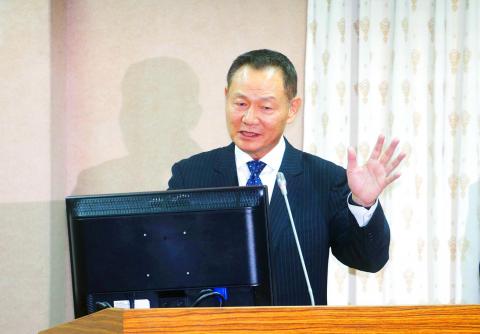China was behind Singapore’s decision to deny entry to Veterans Affairs Council (VAC) Director Lee Shying-jow (李翔宙), the council said yesterday.
Lee, who visited Thailand earlier this month, planned a stopover in Singapore to visit veterans of Taiwan’s armed forces residing in Singapore, but he was denied entry to the city-state despite a tacit agreement that the visit had been approved.
Lee’s status — he has served as deputy minister of national defense, an army commander, director-general of the National Security Bureau and as a senior presidential adviser — reportedly prompted concern.

Photo: CNA
VAC Deputy Director Lee Wen-chung (李文忠) yesterday attributed the incident to China’s interference during a question-and-answer session at a meeting of the legislature’s Foreign Affairs and National Defense Committee.
“[Lee Shying-jow’s planned visit to Singapore was aborted] likely due to Chinese Communist Party interference,” Lee Wen-chung said. “Relations between Singapore and China are tense, so Singapore does not want to create more trouble.”
There has never been a visit by a VAC director to Singapore, Lee Wen-chung said, adding that most of the council’s foreign visits are to the US, where a majority of the overseas veterans’ clubs founded by the council are located.
Lee Shying-jow’s visit to Thailand was to pay his respects and present a commendation to the family of Sung Ching-yun (宋慶雲), a Taiwanese agricultural expert who helped farmers in northern Thailand phase out poppy cultivation and transition to other economically viable crops, Lee Wen-chung said.
In related news, Lee Wen-chung said eight retired military officials, including former army commander-in-chief Cheng Ting-chung (陳廷寵), are to visit China on Thursday next week to attend a “cultural event.”
While the nominal event organizer is a private calligraphy business, the “actual event organizer is usually the Taiwan Affairs Office and relevant agencies,” Lee Wen-chung said.
The council has contacted the retired officials and warned them against making any political comments or doing interviews, he said.
“There is no regulation that stops former military officials visiting China [once a three-year travel restriction expires]. The government could consider imposing a longer travel ban on retired military officials,” he said, adding that key personnel who have had access to highly sensitive information should be placed under a screening mechanism on a permanent basis.
National Security Bureau Third Division Director Lai Yun-cheng (賴蘊誠) said that several of the retired military officials have canceled the visit due to the negative public perception of the trip.
The attendance of retired lieutenant general Wu Sz-huai (吳斯懷) and former generals Wang Wen-hsieh (王文燮) and Hsia Ying-chou (夏瀛洲) at an event in Beijing chaired by Chinese President Xi Jinping (習近平) last month provoked a public outcry and raised concern over national security, with legislators proposing imposing stricter travel restrictions and disciplinary measures on retired military officials.

ROLLER-COASTER RIDE: More than five earthquakes ranging from magnitude 4.4 to 5.5 on the Richter scale shook eastern Taiwan in rapid succession yesterday afternoon Back-to-back weather fronts are forecast to hit Taiwan this week, resulting in rain across the nation in the coming days, the Central Weather Administration said yesterday, as it also warned residents in mountainous regions to be wary of landslides and rockfalls. As the first front approached, sporadic rainfall began in central and northern parts of Taiwan yesterday, the agency said, adding that rain is forecast to intensify in those regions today, while brief showers would also affect other parts of the nation. A second weather system is forecast to arrive on Thursday, bringing additional rain to the whole nation until Sunday, it

LANDSLIDES POSSIBLE: The agency advised the public to avoid visiting mountainous regions due to more expected aftershocks and rainfall from a series of weather fronts A series of earthquakes over the past few days were likely aftershocks of the April 3 earthquake in Hualien County, with further aftershocks to be expected for up to a year, the Central Weather Administration (CWA) said yesterday. Based on the nation’s experience after the quake on Sept. 21, 1999, more aftershocks are possible over the next six months to a year, the agency said. A total of 103 earthquakes of magnitude 4 on the local magnitude scale or higher hit Hualien County from 5:08pm on Monday to 10:27am yesterday, with 27 of them exceeding magnitude 5. They included two, of magnitude

CONDITIONAL: The PRC imposes secret requirements that the funding it provides cannot be spent in states with diplomatic relations with Taiwan, Emma Reilly said China has been bribing UN officials to obtain “special benefits” and to block funding from countries that have diplomatic ties with Taiwan, a former UN employee told the British House of Commons on Tuesday. At a House of Commons Foreign Affairs Committee hearing into “international relations within the multilateral system,” former Office of the UN High Commissioner for Human Rights (OHCHR) employee Emma Reilly said in a written statement that “Beijing paid bribes to the two successive Presidents of the [UN] General Assembly” during the two-year negotiation of the Sustainable Development Goals. Another way China exercises influence within the UN Secretariat is

Taiwan’s first drag queen to compete on the internationally acclaimed RuPaul’s Drag Race, Nymphia Wind (妮妃雅), was on Friday crowned the “Next Drag Superstar.” Dressed in a sparkling banana dress, Nymphia Wind swept onto the stage for the final, and stole the show. “Taiwan this is for you,” she said right after show host RuPaul announced her as the winner. “To those who feel like they don’t belong, just remember to live fearlessly and to live their truth,” she said on stage. One of the frontrunners for the past 15 episodes, the 28-year-old breezed through to the final after weeks of showcasing her unique